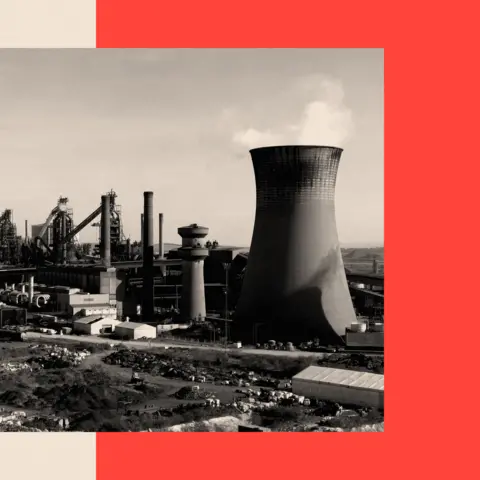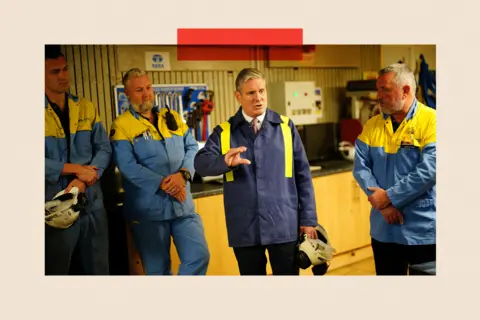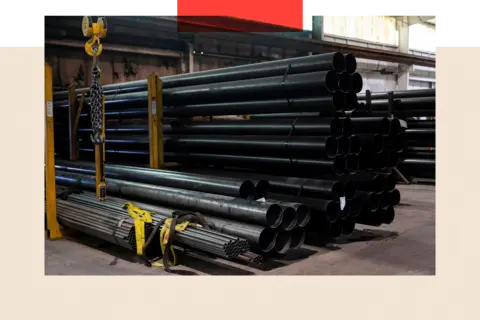Can UK afford to save British Steel – and can it afford not to?

 BBC
BBC“Who was going to blink first?”
A source involved in the fraught negotiations since the election over the future of British Steel told me that as time passed, and literally, coal to keep the furnaces burning started to run out, that was the question – was the government going to offer even more to the Chinese owners of British Steel, Jingye, or act itself?
On Saturday, the government is changing the law to answer that question.
Unless something truly weird happens, Parliament will vote to give Jonathan Reynolds, the business secretary, the power to tell British Steel what to do – in practice, buying coal to keep the fires burning, to keep the once mighty steel industry alive.
Even on Thursday he was offering taxpayers’ cash to buy the raw materials to keep the furnaces alive as a sweetener for Jingye.
At one point in the talks, sources suggest they were asking for a billion-pound taxpayer bailout to keep the plant alive. But I’m told that price wouldn’t have been accompanied by any guarantee that jobs would be saved, or the plant protected for good.
Taking control on Saturday does not do that. The Chinese owners will remain the shareholders, for now. But Labour’s decision literally and metaphorically keeps the flames alive – the government hopes. And it commits taxpayers to start coughing up to save the steel industry – for how long, is a more complicated question.
 PA Media
PA MediaSo what then? Theoretically, Jingye could “get their act together and take the company back”, one insider suggests.
Talking to interested parties on Friday night, that seemed vanishingly unlikely.
The UK government has spent the last couple of weeks trying to tempt them to stay on board with huge inducements. That failed, so the chances of getting back involved seem pretty slim.
There is the possibility that another company wants to swoop in and rescue the business.
Again, don’t hold your breath – the company has been losing money hand over fist, the blast furnaces are nearing the end of their useful life, and the cost of energy it gulps is enormous.
So in the current state, taking on the business as an offer? It’s not that pretty. Remember Jingye were the only bidder last time round – when a Conservative source says, “there were no other bidders – the alternative was closure or nationalisation, and the Conservatives were never going to nationalise”. So will Labour?
 Reuters
ReutersAs of this weekend, that seems pretty likely. Remember the action in Parliament later does not mean nationalisation. But it’s a necessary first step if that is what’s going to happen.
You’ve probably heard ministers again and again say “all options are on the table” – that’s their get out of jail card where they don’t commit to anything in case their preferred option suddenly disappears. But as MPs gather to vote on the next steps, a journey towards nationalisation certainly feels like the direction.
Two different sources who have been part of the wider discussions tell me the prime minister has come to believe that taking British Steel back into public hands is what the government will have to do. There are practical and political reasons for why that might come to pass.
First, for the government to have a hope of achieving its aims – building infrastructure, spending more on defence at home, growing the economy and protecting jobs – it is logical to preserve a steel industry in this country.
That’s not just because ministers are loathe to see good jobs disappear. But because in government, the capacity to make steel is an important part of what the UK needs to be able to do. If the plant closes, the UK would become the only G7 country without primary steel making capability.
That wasn’t something the government was willing to tolerate. So if the private sector won’t do it – enter the state. Although, it wouldn’t be unfair to wonder why they have ended up making this decision at the last minute when the fuel for the furnaces is about to run out, given it was three weeks ago that the company sounded the alarm about possible closures.
 Reuters
ReutersSecond, that requirement to act has become politically attractive because it fits into Sir Keir Starmer’s more and more familiar script, that the new world order has changed – governments need to be more active and agile in protecting their own interests.
It follows, if, as Treasury Minister Darren Jones, told us last week, globalisation is over, then the UK has…
Read More: Can UK afford to save British Steel – and can it afford not to?


